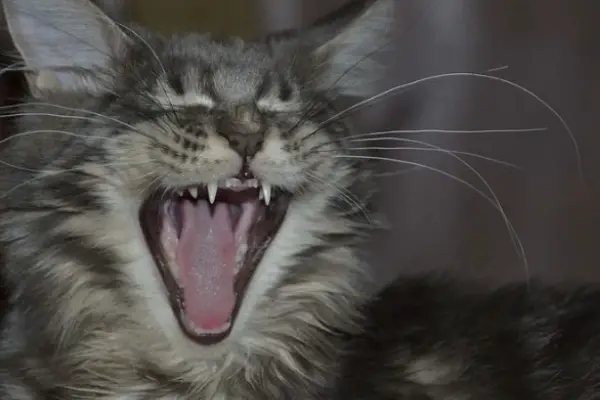Are Mainecoon Cats Aggressive: 12 Reasons For Aggression

Mainecoon cats are very affectionate towards their owners but are Mainecoon cats aggressive, let’s find out together!
In this post, we will outline and discuss some common aggressive triggers in Mainecoon cats you should know.
We will also outline some common ways to resolve aggressive behaviors in Mainecoon cats, so sit tight and read through!
Let me quickly answer your question are Mainecoon cats aggressive before we continue to discuss other things!
Are Mainecoon Cats Aggressive
The Mainecooncat is an excellent family cat that is categorized as a non-aggressive breed of cat, despite the fact that they appear to be aggressive.
MaineCoon cats, on the other hand, may become aggressive if they feel threatened, agitated, or if they are not properly socialized, taught, or cared for.
You can say that sudden changes in behavior due to some aggressive issues is one of the Mainecoons cats behavior problems.
Signs of aggression in Mainecoon cats
Here are some common signs of aggression in Mainecoon cats you should look at for:
- Unnecessary striking out with paws.
- Frequent Hissing.
- Hair standing up on the back of the neck.
- Frequently crouching into a small position
- Continues unnecessary growling.
- Frequently scratching things for no reason.
- Whiskers and/or ears held flat or pointing directly down or straight out.
- Unnecessary twitching or flipping his tail.
- Frequently backing into a corner and restlessness
- Frequently trying to look as large as possible.
Causes of aggression in Mainecoon cats
If not properly cared for, Mainecoon cats can become aggressive for a variety of reasons:
One of the primary reasons why cats get too aggressive as they get older is because of this.
Your cat should be socialized with other cats, humans, particularly youngsters, and other pets.
Make sure to visit other cat or dog owners while your cat is socializing.
Remember to expose your cat to any and all causes of fear that might make him possessive or aggressive.
If a cat isn’t socialized correctly, it will become territorial, aggressive, and attack other cats.
From the kitten stage on, make sure you socialize your cat with loud sounds like the vacuum cleaner and loud music.
There will be no need for aggressiveness if a Maine is well socialized, and you will also obtain an excellent family-friendly cat.
2. Traumatic experience
Your Maine cat may grow aggressive over time as a result of traumatic events, and it may even want to run.
You should also be mindful of signs that your cat has had a traumatic encounter. You must learn how to care for Maine coon cats to avoid unnecessary behavior issues.
If you see any of the traumatic experience symptoms, please seek advice from your veterinarian.
Here are some of the things that might produce a distressing encounter for your Mainecoon cat:
- Escaping from being killed by a predator’s jaws.
- Getting out of human snares.
- A cat and a bigger beast fight to the death.
- Falls from considerable heights result in injuries.
- Disease.
- Neglect of loved ones.
- Exposure to toxins.
- Getting yourself out of a car collision.
- Abuse.
3. Unbearable stress
If a cat lives in a stressful environment, such as a house where people quarrel or a house with too many cats, the cat may become violent.
Cats, like people who grew up in homes with a lot of verbal and physical aggression, or a lot of covert animosities, sometimes act out the dynamics of their human families.
Although a stressed Mainecoon cat is constantly sad, there are several reasons for depression in cats that you should be aware of.
When a Mainecoon cat is overwhelmed with stress, the result may be chronic aggression.
4. Unbearable frustration
When cats are unable to reach the object of their predatory urge, they engage in aggressive behavior known as “redirected aggression.”
An indoor cat, for example, may grow irritated if he observes another cat wandering by or marking his territory in his zone.
Anyone unlucky enough to be in the vicinity at that time, whether another cat, a dog, or a person, may become the focus of the cat’s wrath.
One of the reasons why male and female cats run away from home for several days is out of frustration. Frustrated Mainecoon cats are always aggressive.
5. Fear
An experienced cat caretaker will notice a nervous cat moving sideways and puffing up her tail and fur to make herself look larger.
Her ears will droop, her pupils will dilate, and she will hiss.
Approaching a cat in this state may result in an aggressive response, not because the cat dislikes you, but because she is experiencing a panic reaction.
6. Hormonal changes
When someone tells me their cat is aggressive, hormonal changes are the first thing that springs to mind.
I always inquire as to the age of the cats and whether or not they have been neutered or spayed.
If you don’t want to breed your cat, I recommend neutering or spaying it from 6 months of age.
When they’re in heat, most cats behave strangely. It might be really aggravating depending on how your cat acts during that time.
It’s not nice to hear your cat meow or even wail at all hours of the day or night. It’s also not enjoyable to have a cat mark its territory.
Aside from that, when their hormones are out of control, certain cats might become violent.
7. Constant changes in daily routine
Most Mainecoon cats become overly territorial and aggressive as a result of changes in their daily routine.
Whenever you disrupt your normal pattern, your cat becomes destabilized, which might lead to unwarranted aggressiveness.
Allow constant food and grooming times and avoid altering things since it will be too much for your cat to manage.
8. Poor training
All pets, especially the Mainecoon cat, require some form of training.
Starting obedience training with your Mainecoon cat should be your first priority.
Ensure that your Mainecooncat has everything he or she requires, including engaging toys.
Socialization is an important part of a Mainecoon cat’s training.
Biting, nipping, and other unwanted habits can be eliminated through training.
Always begin teaching your Maine when it is a kitten.
9. Loneliness or boredom
Cats can develop separation anxiety when they are confined in a box for a lengthy amount of time or if they are separated from their owners.
This led to unwarranted hostility and furniture biting or scratching.
This is a major contributor to most cats’ pointless behavior.
Maine cats like exploring their environment and being around their owners.
If you are not always available, consider getting a second pet.
10. Continues abuse by the owner
Your Maine cat may become aggressive as a result of abuse or neglect from a loved one.
Maine cats want affection and warmth from their humans, and neglecting them may result in biting or animosity.
Here are some guidelines for determining whether or not someone has been abused or neglected:
- Always shouting at a cat when you should be making corrections.
- Using the tongue of a cat to lick its excrement.
- Cleaning a cat’s urine with its nose.
- Putting a cat in a room after it has committed a crime.
- A cat is being thrashed.
- When a cat is in need of attention, chasing it away is not a good idea.
- Allowing your cat to consume leftovers is a good idea.
- The litter box is not changed or cleaned on a regular basis.
- You never give your cat a bath.
- You’re not brushing your cat.
- Ignoring your medical requirements is a bad idea.
11. Illnesses
When Maine cats are unwell, they become unnecessarily aggressive.
When they’re unwell, they can bite their owners, so take your Maine cat to the vet if you see anything unusual.
Mainecoon cats suffer from a disease that has been identified as being particular to them and may be cured.
A Maine coon cat cannot be violent unless it is sick, because when they are sick, they are in agony, which causes them to become aggressive.
Here are some of the most prevalent health issues that Mainecoon cats face: Hypertrophic cardiomyopathy, Flat-chested kitten syndrome, Distal neuropathy, Patellar luxation, hip dysplasia, etc.
12. Chronic pains
In order to protect its body while recuperating, an injured cat will instinctively try to defend itself from anybody and anything.
If your cat is injured or in discomfort, it may withdraw and even strike out at you.
Urinary tract infections, stomachaches, and parasites are all conditions that might cause a cat to become more aggressive.
Ways to prevent aggression in Mainecoon cats
The majority of the causes of a Maine cat’s aggressive behavior may be traced back to the owner.
So, here are a few pointers to protect your Maine cat from being aggressive:
- Socialization of Maine kittens at an early age.
- Grooming your Mainecoon cat on a regular basis is essential.
- Regular medical examinations of your Maine cat are required.
- A huge quantity of interactive toys should be purchased.
- Spend quality time with your Maine cat.
- Invest in a second companion pet.
- Cat deterrents should be removed from your house.
- Create a cat-proof environment in your house.
- Your Maine cat should be neutered or sprayed.
- Early obedience training is essential.
- Put an end to your Mainecoon cat’s daily routine is changed always.
I strongly hope your question about is Mainecoon cat’s aggression was answered! Read more about cat aggression.


![Where Do Feral Cats Sleep [9 Places] Where Do Feral Cats Sleep](https://petcreeks.com/wp-content/uploads/2021/07/Where-Do-Feral-Cats-Sleep-768x644.jpg)

![Are Beagles Good With Cats [What You Should Know] Are Beagles Good With Cats](https://petcreeks.com/wp-content/uploads/2021/04/Are-Beagles-Good-With-Cats.jpg)

